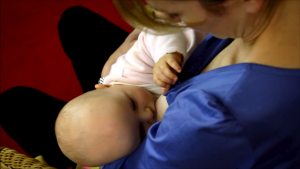To make breastfeeding at night easier:
Have your baby in a bed space next to your bed e.g., a safety approved cot that attaches to your side of the bed.Breastfeeding at night is an integral part of establishing breastfeeding because night feeds promote your milk supply. Newborn babies have little stomachs and need feeds throughout the night too just like other baby mammals, such as kittens and puppies. However, if you’ve spent the rest of your adult life enjoying blissful uninterrupted sleep, having to wake up several times in the night is really hard and tiring. The good news is that night feeds become less frequent and more quick and efficient as your baby gets older. Feeding your baby at night is also easier if you are breastfeeding compared to bottle feeding and the hormones which produce and supply your milk also help you get back to sleep faster.
Many mothers find that although night time feeds can be exhausting they also enjoy this quiet time with their baby away from the hustle and bustle of day time especially if there are other children needing attention. However, there are several things you can do to make night feeds less disruptive to both you and your baby’s night.
Have your baby sleeping in a bed space next to your bed or co-sleep safely.
Cots or cribs that attach to your side of the bed make it quicker and more convenient to sense your baby stirring for a feed and feeding them quickly, rather than waiting to hear them cry from another room or at a distance. Research suggests that breastfeeding mums actually get a better quality night’s sleep than other parents.
Sleep in the same room as your baby

The Department of Health and the American Academy of Pediatrics recommends that your baby sleep in the same room as you for at least the first six months to protect your baby from Sudden Infant Death Syndrome (SIDS). It also means that you will be able to quickly feed your baby without having to wait for your baby to cry to get your attention from a distant nursery and keep having to get up and go to another room.
It can really make some night feeding more restful if you learn to feed lying down on your side with you and your baby lying tummy to tummy. It is really nice as it’s much more restful and particularly comfortable if you have had a caesarian as it means that your baby isn’t lying on your scar during a feed (many mums who have had C-sections will breastfeed on their side during the day too!) You may fall asleep while breastfeeding as hormones in breastmilk can make you sleepy too. It’s important to have a safe sleeping space for both of you. You can read more from the Infant Sleep Information Source.

In the early days with your newborn baby, try to nap when your baby naps or if you have family around, let them look after your baby while you have a lie in to catch up on some sleep.
Getting up in the night to breastfeed your baby is tough. All new parents feel tired and sleep deprived but breastfeeding mums who feed their babies at night enjoy several advantages: